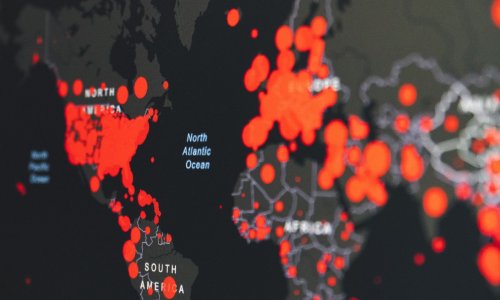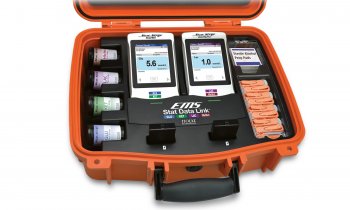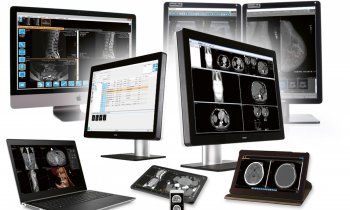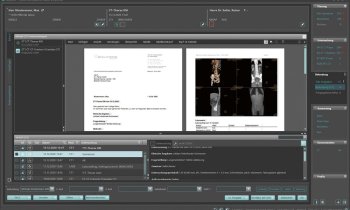Article • Disease management
Covid-19 and beyond: Unlocking the value of diagnostic data
Diagnostic data from the massive amounts of testing being conducted can help make health systems more resilient in dealing with future health crises and pandemics. The importance of diagnostic data was explored during the Medtech Europe online session, “Unlocking the Value of Diagnostic Information – how to make European Health Systems more resilient?” where delegates heard that health-related information from diagnostic testing had proved invaluable during the Covid-19 pandemic for disease management and targeted treatment.
Report: Mark Nicholls
Taking the example of respiratory tract infections against the backdrop of the Covid-19 pandemic, panellists discussed how better leveraging diagnostic information can enhance the resilience of health systems in the future. Moderated by Hans Martens from the European Policy Centre think tank, the discussion included details of the MedTech VODI (Value of Diagnostic Information) framework and its application to acute respiratory infections. He said: “The whole issue is about extracting maximum of value of the massive testing that has been going on for a long time – not just because of Covid-19 – but are we really getting the full value out of it? I think that answer is no, not at the moment.”
Such data, he continued, will be important for more resilient health systems in Europe because of the burden on “already exhausted” health systems after the pandemic with late treated, or untreated, conditions.

Professor Rosanna Peeling is Professor and Chair of Diagnostics Research at the London School of Hygiene and Tropical Medicine (LSHTM) and Director of the International Diagnostics Centre (IDC), highlighted how the use of data, visualised on global maps, enabled tracking of the spread of the virus to identify hotspots and vulnerable populations. “The essence of having big data that is visualised in real time is a really big help for a lot of countries,” she said. “It is not only global data but can go down to levels of regional data for Europe, country data, and then down to cities and different areas. This is the power of data connectivity that we have today. What is increasingly important is feeding diagnostic data, along with symptoms from patients and science, into apps to allow clinical diagnosis to be more accurate. With Artificial Intelligence, we have the power to be able to reduce a lot of the uncertainty of clinical diagnosis. If the diagnostic information is fed in real time into an app, the clinician can have a list of differential diagnosis very readily.”
Diagnostic information can be digitised and used in a much broader way than previously and will prove an extremely powerful tool going forward, especially for respiratory diseases, added Professor Peeling.
While diagnosis is an important part of prevention as earlier identification of a case not only leads to appropriate treatment for patients but also allows for public health measures to be implemented, she also underlined the importance of privacy and data security. “In preparation for the next epidemic or pandemic, we need to think clearly about public health implications and how we develop that framework so that privacy or confidentiality is protected along with the power to make the data available on a population basis for the public good.”
Dr Timothy Jinks, Head of the Drug Resistant Infections Programme at the Wellcome Trust, said there is an underutilisation and a mis-valuing of the role that diagnostic information can play.
Alongside impacting on disease management and treating patients, as well offering resilience in healthcare, he said that high quality diagnostic information has a public health management value. “What we are able to see with the example of Covid-19 is near real-time informing of epidemiological surveillance. That is important and should be built into systems as we move forward and not just be part of an emergency response,” he said. “There needs to be a much more systematic approach to understanding the value of diagnostic information.”
Regina Kloss-Wolf, chair of MedTech Europe VODI group, also detailed the Value of Diagnostic Information concept that embraces the full range of diagnostic benefits testing beyond the traditional clinical and health economic domains and covers benefits for patients, and operational efficiency of health systems, healthcare providers and management. Following on from work proving the value of diagnostic information in heart failure, the second case study has focused on respiratory infection in light of the Covid-19 pandemic.
Profile:
Rosanna Peeling is Professor and Chair of Diagnostics Research at the London School of Hygiene and Tropical Medicine (LSHTM) and Director of the International Diagnostics Centre (IDC). A medical microbiologist, Professor Peeling’s has extensive experience conducting implementation research on the introduction of new diagnostics to ensure optimal uptake and sustainable adoption. She was previously Research Coordinator and Head of Diagnostics Research at the UNICEF/UNDP/World Bank/WHO Special Programme on Research and Training in Tropical Diseases (WHO/TDR).
28.04.2021











